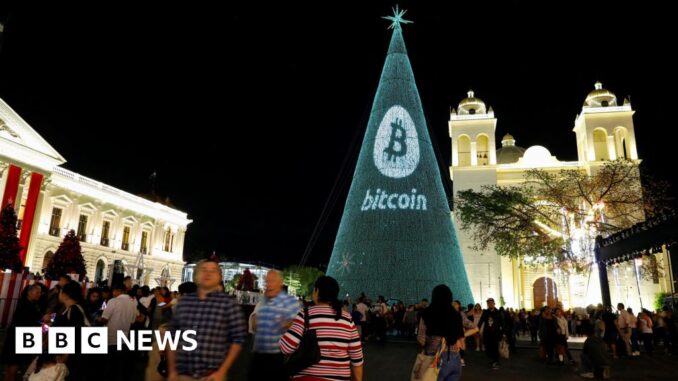
El Salvador has struck a $1.4bn (£1.1bn) loan deal with the International Monetary Fund (IMF) after agreeing to scale back its controversial bitcoin policies.
The IMF said risks related to the adoption of the world’s largest cryptocurrency had eased now that businesses will be allowed to decide whether or not to accept bitcoin.
In 2021, El Salvador became the first country in the world to make bitcoin acceptance mandatory.
The decision to change the policy comes just days after the cryptocurrency hit a record high of more than $108,000.
“The potential risks of the Bitcoin project will be diminished significantly in line with Fund policies,” the IMF announcement said.
“Legal reforms will make acceptance of Bitcoin by the private sector voluntary. For the public sector, engagement in Bitcoin-related economic activities and transactions in and purchases of Bitcoin will be confined.”
The deal, which is aimed to help support El Salvador’s economy, still needs to approved by the IMF’s executive board.
The IMF had opposed the Salvadorean President Nayib Bukele’s crypto-friendly policies, warning they could become an obstacle to it offering financial assistance.
Still, Mr Bukele celebrated on social media as bitcoin rallied after Donald Trump’s US election victory in November.
Earlier this month, as the price of bitcoin topped $100,000 for the first time, Mr Bukele said in a social media post that his country’s holdings in the cryptocurrency had more than doubled in value.
He also blamed his political opponents for causing many Salvadorans to miss out on bitcoin’s rise.
The cryptocurrency has rallied since Donald Trump’s election victory on the 5 November.
The incoming Trump administration is seen as being far more friendly towards cryptocurrencies than President Joe Biden’s White House.
On Thursday, the cryptocurrency retreated along with global stock markets after the US Federal Reserve signalled a slower pace of interest rate cuts next year.
Bitcoin is currently trading just below $100,000.


Be the first to comment